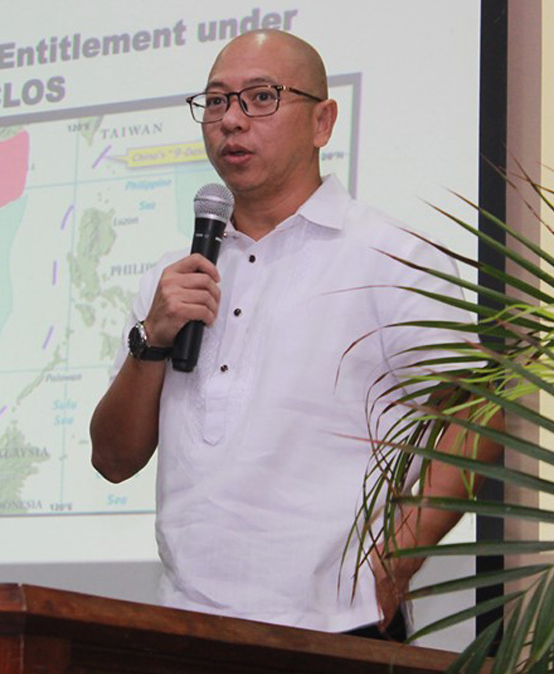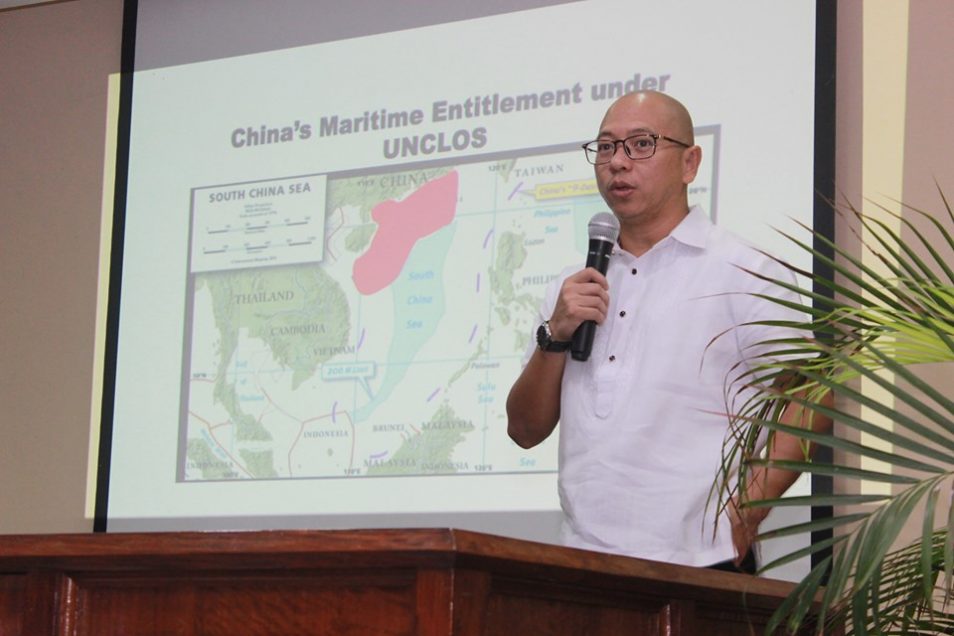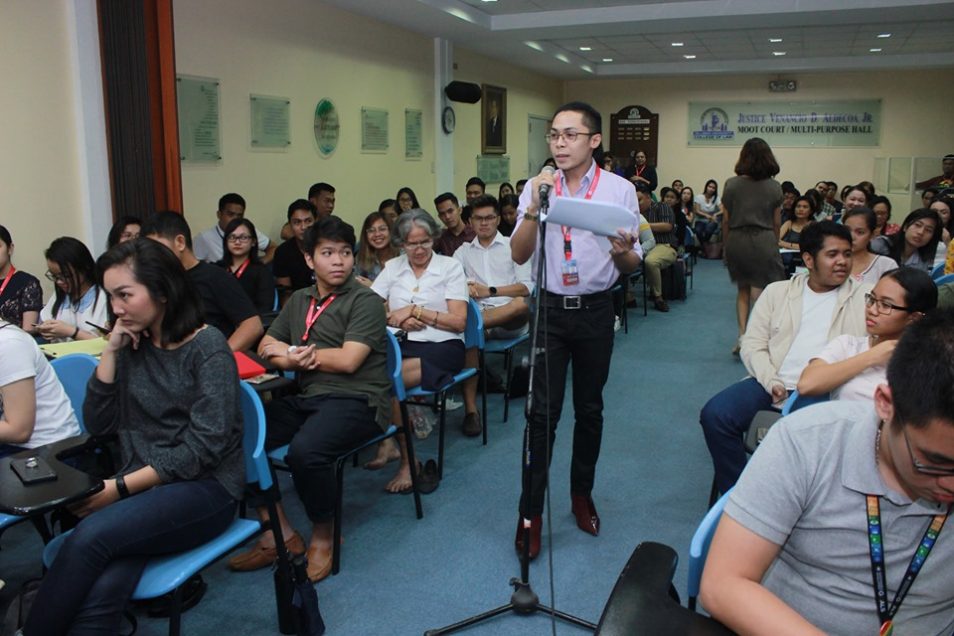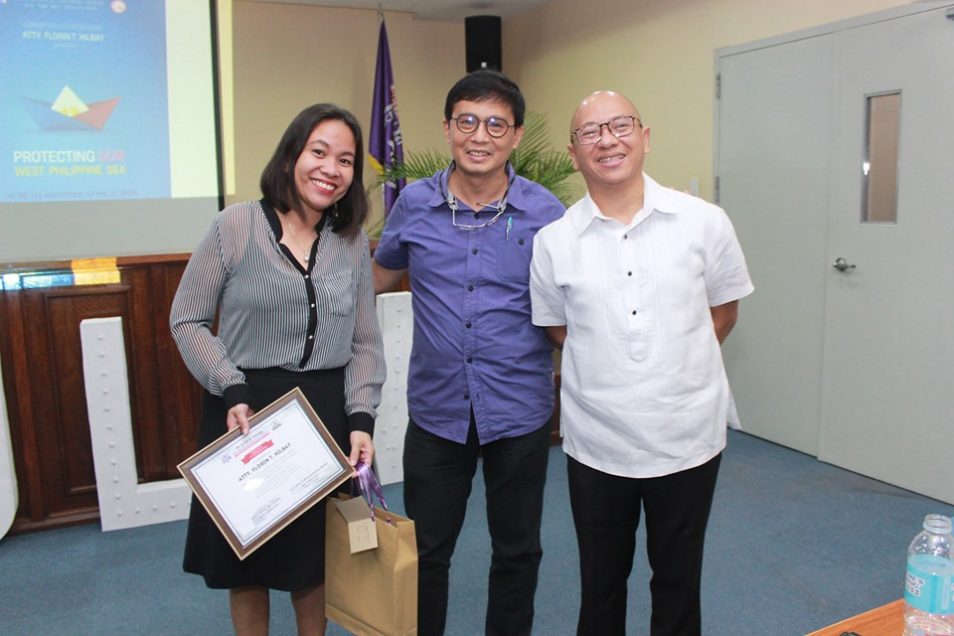
Former SolGen talks on West Philippine Sea
“If you look simply at the laws, it’s very clear that we have the legal basis and the government has the legal obligation to protect all these waters,” said former solicitor general of the Philippines Atty. Florin T. Hilbay during his lecture on the West Philippine Sea, July 6 at the Justice Venancio D. Aldecoa Moot Court, Villareal Hall, Silliman University (SU) College of Law.

Atty. Florin T. Hilbay, former solicitor general of the Philippines
The Dr. Jovito R. Salonga Center for Law and Development and the SU College of Law organized Hilbay’s lecture on “Protecting Our West Philippine Sea on the Third Anniversary of the Philippines v.s. China” arbitration case, which was attended by professors, lawyers, undergraduate and law students from SU, Foundation University and Negros Oriental State University.
Hilbay represented the Philippines as the second agent in the international case against China filed before the International Tribunal for the Law of the Sea in 2013.
The Philippines won the case in July 2016 after the arbitral tribunal at the Permanent Court of Arbitration ruled in favor of the Philippines, nullifying China’s claims over the majority of the South China Sea which included the West Philippine Sea.
In his lecture, Hilbay talked about the case presented before the tribunal, divided into three main parts: the attack on China’s “nine-dash line” claim over the South China Sea, China’s claims over Scarborough Shoal, and the characterization and status of features in the Spratly Islands.
Hilbay said China’s nine-dash line claim covers about 90 percent of the sea, including areas that China contests with the Philippines, Vietnam, Malaysia and Indonesia, hence these countries also benefit from the tribunal’s ruling.
Hilbay also mentioned the ruling that China and the Philippines have no overlapping entitlements in the areas of Mischief Reef, Second Thomas Shoal, and Reed Bank at the West Philippine Sea.
“That means that all of these areas are ours, exclusively, and this is by force of the (tribunal’s) decision. If you look at the map, it makes a lot of sense because like I said, Reed Bank (for example) is only about 84 nautical miles away from Palawan, whereas it’s about 540 nautical miles away from China,” he added.
On the distinction of rights in the 12-nautical mile territorial sea and the 200-nautical mile Exclusive Economic Zone (EEZ), Hilbay said that while the territorial sea is an area of sovereignty, the EEZ is still an area of jurisdiction as part of the national territory.
“You have a difference in rights but the obligation to protect (the EEZ) is just as important, because it’s part of your national territory. In fact, in Article 12 of our constitution, our EEZ is specifically mentioned, [stating that it is] entitled to protection and exclusively reserved for Filipinos,” he said.
Hilbay then cited the incident at the Reed Bank last June wherein a Chinese vessel hit a Philippine fishing boat, which brought into question the presence of China in the West Philippine Sea.
On the incident, Hilbay said it does not have to be proven if the Chinese vessel engaged in fishing or poaching in the Reed Bank because the vessel’s presence or entry in Philipine waters already creates a prima facie presumption that the vessel is conducting those activities.
Under the Philippine Fisheries Code, Hilbay said it is “unlawful” for any foreign person, corporation or entity to fish or operate any fishing vessel in Philippine waters, which he said includes the EEZ.

“If they’re not fishing [and] they’re simply passing through, then that’s a matter of fact they can establish during a trial, but we have the right to board, arrest, [and] inspect [the vessel]…The law itself creates a presumption and that presumption makes sense. If you were a Chinese fisherman…and you’re found 547 nautical miles away from your waters, eh ano pang ginagawa mo diyan? (What are you doing there, then?),” he said.
Hilbay disproved the notion that the Philippines cannot take action after the said incident at the Reed Bank in fear of starting a “war” with China.
He said in 2014 and 2016, Chinese fishermen were arrested for poaching in Philippine waters.
“We have a history of arresting poachers that we find. Have we ever entered into war with China because of those arrests? No. When I was solicitor general, we were able to diplomatically manage the arrest and judicial proceedings incidental to the arrest of those Chinese fishermen…so, we can do it. We can enforce our rights to the Exclusive Economic Zone without threatening China with war,” said Hilbay.
He also said the enforcement of sovereign rights on territorial waters through measures including arrests, judicial proceedings, boarding and inspection is supported by Article 73 of the United Nations Convention on the Law of the Sea.
The tribunal’s ruling on the case against China, said Hilbay, is “final” and can serve as a basis for what the Philippines can do, but it all “boils down to the Philippines” deciding to assert its rights.
Atty. Hilbay was a professor at the University of the Philippines College of Law before he filed his senatorial candidacy for the May 2019 elections. He taught Constitutional Law at the SU College of Law during the second semester of academic year 2006-2007.

(L-R) Atty. Sheila Lynn M. Catacutan-Besario, dean of the Silliman University College of Law; Atty. M. Mikhail Lee L. Maxino, director of the Dr. Jovito R. Salonga Center for Law and Development; and Atty. Hilbay.
(Photos by Nash Denver Baya, from the Dr. Jovito R. Salonga Center for Law and Development Facebook page)


